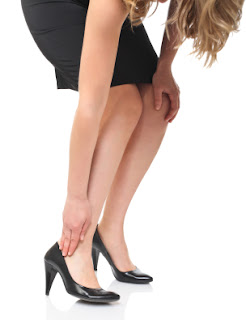Causes of plantar fasciitis
 |
| A common cause of plantar fasciitis |
So what causes the plantar fascia to become inflamed? There are a number of different reasons for this to occur. For example, you are more likely to develop plantar fasciitis, if you are over 50, if you are overweight, or pregnant, or if you have a job that requires a lot of walking or standing on hard surfaces. You are also at risk if you do a lot of walking or running for exercise (repetitive trauma). And if you have tight calf muscles (which many people have) you are also more likely to develop plantar fasciitis.
Research has shown, however, that the number 1. cause of plantar fasciitis is over-pronation (or Fallen Arches).
Over pronation of the feet is very common, at least half of the population has this problem, but most people do not realize they have this condition! Over-pronation simply Means That the feet and ankles roll inwards too much walking and falling on That the arches collapse. With age, most people tend to over-pronation. However, this condition is not uncommon in children and adolescents, as well as athletes.
The arch collapses when the two points outside of the arc (being the heel and sole) are being located farther from each other. This puts repetitive stress on the plantar fascia. Fixing the molding of the heel bone is a small area of tissue, with respect to the wide attachment region for the toes. Therefore, the excess of constant tension on the fascia will damage the weakest point attachment.
During irritation occurs to the heel bone, followed by inflammation and micro-tearing of the plantar fascia tissue. Sometimes swelling is present. If the tension continues the heel bone is the "answer" and develop a bone growth on the front of the heel bone. This is considered a "heel spur." Interestingly, the heel spur itself does not cause any pain, but the inflamed tissue around it does.
0 comments:
Post a Comment